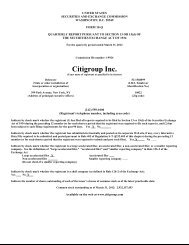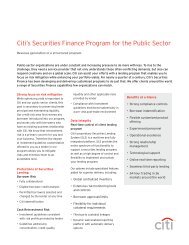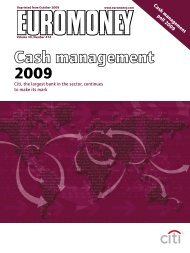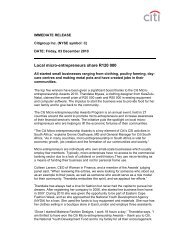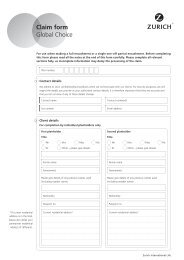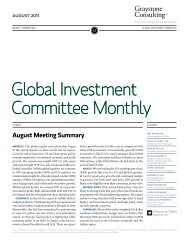Citigroup Inc.
Citigroup Inc.
Citigroup Inc.
Create successful ePaper yourself
Turn your PDF publications into a flip-book with our unique Google optimized e-Paper software.
The repurchase reserve estimation process is subject to numerousestimates and judgments. The assumptions used to calculate the repurchasereserve contain a level of uncertainty and risk that, if different from actualresults, could have a material impact on the reserve amounts. The keyassumptions are:• loan documentation requests;• repurchase claims as a percentage of loan documentation requests;• claims appeal success rate; and• estimated loss given repurchase or make-whole.For example, Citi estimates that if there were a simultaneous 10% adversechange in each of the significant assumptions, the repurchase reserve wouldincrease by approximately $342 million as of December 31, 2010. Thispotential change is hypothetical and intended to indicate the sensitivity ofthe repurchase reserve to changes in the key assumptions. Actual changes inthe key assumptions may not occur at the same time or to the same degree(i.e., an adverse change in one assumption may be offset by an improvementin another). Citi does not believe it has sufficient information to estimate arange of reasonably possible loss (as defined under ASC 450) relating to itsConsumer representations and warranties.Securities lending indemnificationsOwners of securities frequently lend those securities for a fee to other partieswho may sell them short or deliver them to another party to satisfy someother obligation. Banks may administer such securities lending programs fortheir clients. Securities lending indemnifications are issued by the bank toguarantee that a securities lending customer will be made whole in the eventthat the security borrower does not return the security subject to the lendingagreement and collateral held is insufficient to cover the market value ofthe security.Credit card merchant processingCredit card merchant processing guarantees represent the Company’s indirectobligations in connection with the processing of private label and bankcardtransactions on behalf of merchants.<strong>Citigroup</strong>’s primary credit card business is the issuance of credit cards toindividuals. In addition, the Company: (a) provides transaction processingservices to various merchants with respect to its private-label cards and(b) has potential liability for transaction processing services provided by athird-party related to previously transferred merchant credit card processingcontracts. The nature of the liability in either case arises as a result of abilling dispute between a merchant and a cardholder that is ultimatelyresolved in the cardholder‘s favor. The merchant is liable to refund theamount to the cardholder. In general, if the credit card processing companyis unable to collect this amount from the merchant the credit card processingcompany bears the loss for the amount of the credit or refund paid tothe cardholder.With regard to (a) above, the Company continues to have the primarycontingent liability with respect to its portfolio of private-label merchants.The risk of loss is mitigated as the cash flows between the Company and themerchant are settled on a net basis and the Company has the right to offsetany payments with cash flows otherwise due to the merchant. To furthermitigate this risk the Company may delay settlement, require a merchantto make an escrow deposit, include event triggers to provide the Companywith more financial and operational control in the event of the financialdeterioration of the merchant, or require various credit enhancements(including letters of credit and bank guarantees). In the unlikely event thata private-label merchant is unable to deliver products, services or a refund toits private-label cardholders, the Company is contingently liable to credit orrefund cardholders.With regard to (b) above, the Company has a potential liability forbankcard transactions with merchants whose contracts were previouslytransferred by the Company to a third-party credit card processor, should thatprocessor fail to perform.The Company’s maximum potential contingent liability related to bothbankcard and private-label merchant processing services is estimated to bethe total volume of credit card transactions that meet the requirements to bevalid chargeback transactions at any given time. At December 31, 2010 andDecember 31, 2009, this maximum potential exposure was estimated to be$65 billion and $60 billion, respectively.However, the Company believes that the maximum exposure is notrepresentative of the actual potential loss exposure based on the Company’shistorical experience and its position as a secondary guarantor (in the caseof previously transferred merchant credit card processing contracts). Inboth cases, this contingent liability is unlikely to arise, as most productsand services are delivered when purchased and amounts are refunded whenitems are returned to merchants. The Company assesses the probability andamount of its contingent liability related to merchant processing based onthe financial strength of the primary guarantor, the extent and nature ofunresolved charge-backs and its historical loss experience. At December 31,2010 and December 31, 2009, the estimated losses incurred and the carryingamounts of the Company’s contingent obligations related to merchantprocessing activities were immaterial.Custody indemnificationsCustody indemnifications are issued to guarantee that custody clients willbe made whole in the event that a third-party subcustodian or depositoryinstitution fails to safeguard clients’ assets.OtherAs of December 31, 2010, <strong>Citigroup</strong> carried a reserve of $254 millionrelated to certain of Visa USA’s and MasterCard’s litigation matters. As ofDecember 31, 2009, the carrying value of the reserve was $121 million andwas included in Other liabilities on the Consolidated Balance Sheet.279



